Although, understandably, there might be times when an owner might want to teach their cat right from wrong, is it even possible or recommended to discipline or punish a Bengal cat?
Bengals are very persistent cats. If it opens, they can probably get in if they really wanted to get at something. There are times when they’re a handful, but it’s just part of the breed in the end. They’re a loving and active breed that they want to be engaged with.
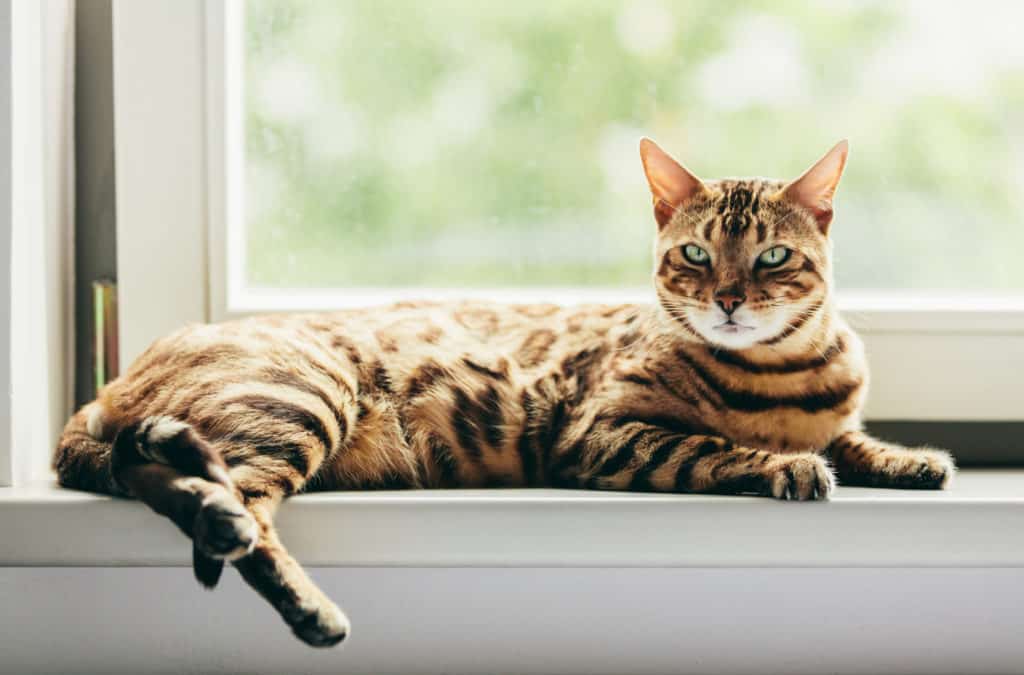
So how do you discipline a Bengal cat? If you’re looking for ways to punish or discipline a Bengal or another cat, it’s going to affect your relationship with your cat negatively. The best way to guide a Bengal cat’s actions is by setting up its environment so that it doesn’t want to “misbehave.” Through having a 1. yes/no environment, 2. play therapy, and 3. using a bit of misdirection, it’s simple to get a Bengal or any cat, in general, to be guided in the right direction.
What Are Some Common Behavioral Problems in Bengal Cats?
Bengals are domestic cats like any other cats, but they can be more prone to behavioral issues if their owner is not prepared for them because of their high activity levels!
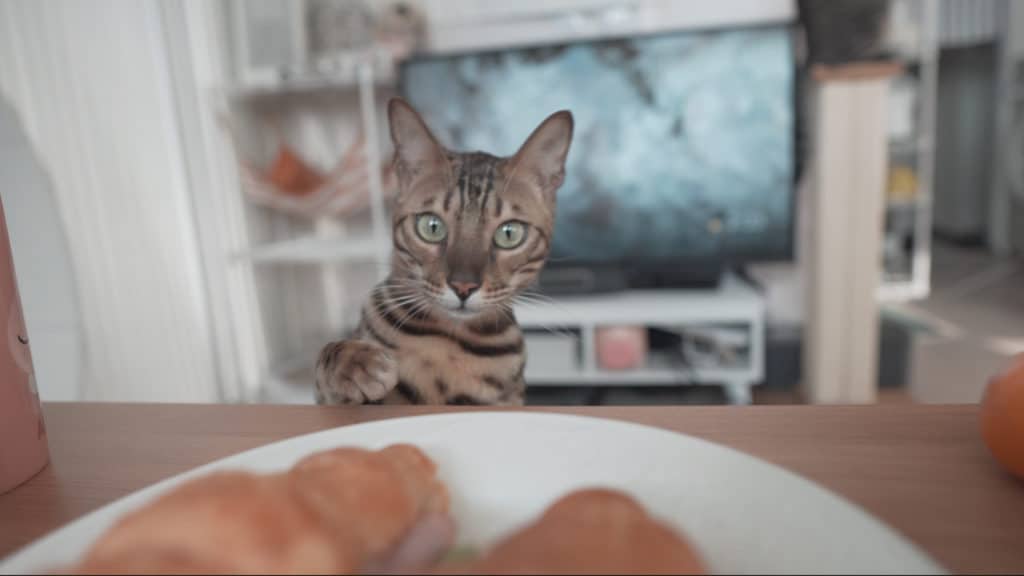
Some of these problems might include:
- Continuously trying to get onto the countertop and sink – could be many reasons, either to get to a high vantage point, the sound of running water, or the smell of leftover food in the sink.
- Getting into cabinets and drawers – cats have seriously sensitive noses, most house cats will smell and won’t act. Bengals will smell the goodies and go retrieve it.
- So hyperactive that they bother you or other animals around the house – Bengals are one of the most energetic cat breeds. As kittens, Bengal cats are lovable monsters and do “calm down” a bit as they age but for the most part, retain their highly active personality.
- Biting, scratching inappropriate things, or being destructive – Bengals are proactive, they love to hit and bite things, just to see how it would react. If it was up to them, they’ll play everything until it’s not fun anymore and move on to the next thing.
For Bengal cat prices and other important information, read: How Much Do Bengal Cats Cost?
Why Can’t You Discipline or Punish a Bengal Cat?
A cat can never understand “discipline” or “punishment.” Bengals are no different no matter how smart they are compared to other cats. Any physical punishment or discomfort/pain you might cause to punish them will be taken as inexplicable aggression. It will seriously negatively affect your relationship with your pet.
What makes a cat tick is how they act upon their instinctual nature. Instinctual means acting upon something innate to them. They can’t control it even if they could speak to us.
It’s why kittens know where to go to the bathroom (the litterbox), where there is some granular material with little to no instructions from their mother!
So rather than punishing a cat for doing something that they would do naturally in the wild, we must instead provide the proper stimulating alternatives in their environment so that they can explore and interact safely.
What Are Some Ways to Prevent Misbehavior in Bengal Cats?
Bengals cats are basically house cats on some cat speed. If your cat is bored and is batting things off of tables, well, you better believe a Bengal cat will bat at it and maybe take it apart for fun. If your cat is getting into cabinets, you should expect a Bengal to get into a cabinet and then drag out whatever smells good to eat.
For those that are short on time, here are some quick ways to prevent misbehavior & non-directly discipline your Bengal cat:
- Make them uncomfortable through the clever use of detterants
- Expend their energy quickly
- Misdirect & distract if your Bengal cat is biting/aggressive
- Have a companion to allow them to learn from each other
Use a Yes/No Environment to Correct a Bengal Cat’s Behavior
It’s best to be prepared for a Bengal’s energy and instinctual prowess by having a clear yes/no environment.
Consider your environment whenever you take in a Bengal cat. Remember, a cat always acts upon its instinctual needs above everything else. While this might sound like you have to change everything about your room, all it takes is a couple of changes!
The concept of a Yes/No environment means to have places where cats know instinctually, feels good to use (Yes), and places that aren’t as comfortable or appealing (No). We can provide the Yes places quite easily by giving them instinctually satisfying alternatives and deterring them by having something they dislike, whether texture or smell, near that surface or area.
For the No surfaces, putting things uncomfortable for cats such as double-sided sticky tape or strong smells like citrus (orange peels and scents).
It creates unpleasant feelings for the cats when they go on it. As a result, they associate these uncomfortable things with these surfaces, creating the habit of staying off these surfaces.
Example Solutions
- Suppose your Bengal cat is going onto countertops. Take a look around you. If the countertop is the tallest place they can get to, it makes sense that cats will want to get on it.
Cats will always try to get to the tallest place because survival traits pass through their ancestors. It provides safety and a good spot to survey its surroundings. Bengals also love to climb whenever they have the opportunity. Having multiple high perches will make the countertop or any other human surface not as appealing.
Leave an orange peel or two on the countertop for a few days and see how the cats react. Most cats hate the strong smell of citrus and will try to avoid it! After a while, you can take the peels away as they learn to avoid them.
- If your Bengal cat goes into drawers. Then it’s because they smell something in there to eat, and they will somehow get in there. Bengal cats are persistent and smart, a terrifying combination. So either put the snacks or food in a place in which requires a human touch to open (like a place with doors or latches) or put the snacks in a sealed bag so that they cannot smell it.
If need be, tape some cabinets shut. There are also specialized latches made so that it is difficult to open. Therefore, it’s best to treat your Bengal cat like a newborn baby, and Bengal proof that home!
- If your Bengal is scratching up your furniture. Usually, this means that they do not have a stable, proper place to scratch. Please read my article here about how to protect your furniture!
You might say you already have a cat-scratching post. However, if it’s not sturdy enough and tall enough to stretch out their full bodies, they will prefer a couch instead.
A couch has a wide, stable base and allows them to stretch out. Therefore having a taller and more stable scratching post is important. They will rarely ever scratch furniture intentionally with a well-built and proper scratching post.
I recommend the Smartcat Ultimate Scratching Post! I am still using it after over a year of use! You can view the full review here!
Use Play Therapy and Hunting Activities to Curb Aggressive Behavior in Bengal Cats
The last two common behavioral problems are probably the one that is most offensive to people. Biting, scratching, and in general being a nuisance whether it’s to you or other animals in a home. People have a hard time dealing with “aggression.”
One of the main instinctual needs for a cat is to find something to hunt and kill. There should be things in a cat’s environment (your apartment) to help encourage this behavior.
A bored cat is a “misbehaving” cat.
What makes a cat bored? Not enough hunting (i.e., play). Bengal cats require a lot of attention and play, especially when they’re younger. Once they get out of their crazy kitten phase, they become a little mellower but still active.
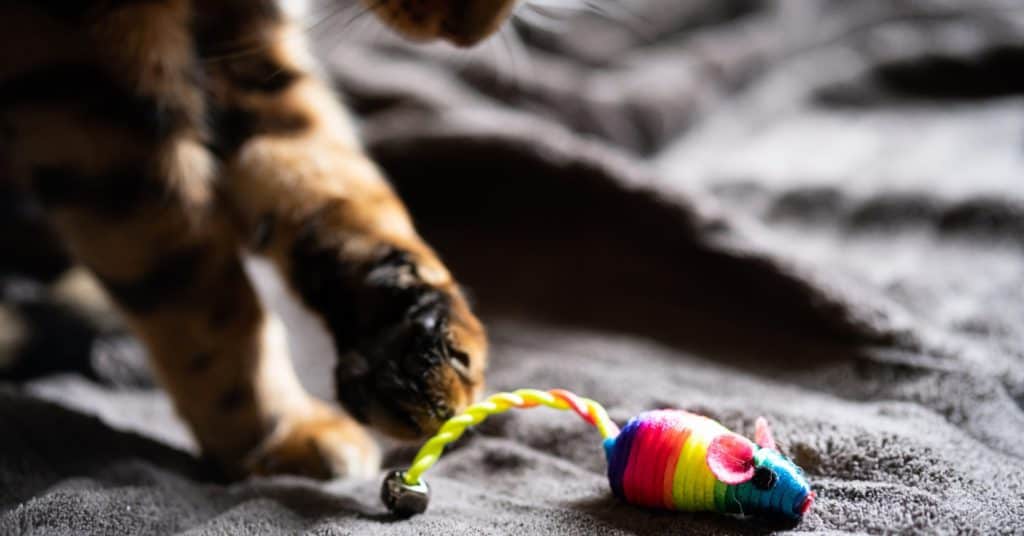
Tiring out a Bengal cat is one of the best ways to control their actions.
Example Solutions
- If your Bengal is aggressive and giving bites or having some destructive behavior in your home. It’s time to schedule more playtime with them. Remember, playtime means hunting time. This doesn’t mean using your hands to play with your Bengal unless you want him to start thinking your hand is a toy.
In general, how a cat hunts in the wild is how you want to simulate it in your own play with your Bengal. Bengal cats love interactive wand toys and love a good session of hiding and seek! For a more detailed article about play and hunting, please read about it here!
Use Misdirection to Redirect a Bengal Cat’s Behavior
Another great behavior correcting tool is misdirection. Basically, the goal of misdirection is to “direct” that negative behavior onto something else. Therefore, not stopping the specific behavior but allowing them to act it out on something that might be more acceptable.
Again, cats are habitual animals, and all habits are hard to break. So, it’s actually a lot easier to replace a habit rather than breaking one.
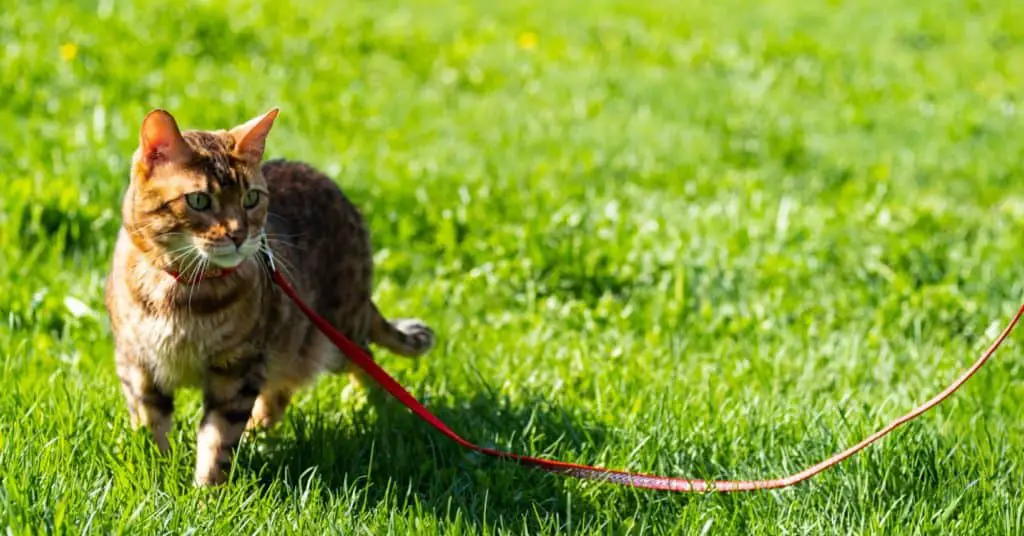
Example Solutions
- If your Bengal cat is biting or getting over stimulated but it’s difficult to get them to stop, get their attention with their favorite type of toy and throw it in a random direction. They’ll go darting towards the toy.
This allows them their focus to go to the toy instead and start to learn that some items are for play and some things are not (like your hand or thigh). When my Bengal was a kitten, I always had some small toy in my pocket. At that time, he loved to nip at ankles and feet. So, as soon as he would try to bite on my feet, I would throw the toy to the other side of the room, which kept him busy. Now, he never bites any feet or hands.
The toy wasn’t extraordinary either. It can be anything they enjoy playing with. My Bengal loves his sponge ball. Whenever he was overactive or overly rough, it was an easy toss of the sponge ball, and his attention is directed away from whatever he was doing. Super useful for those times when you’re in a pinch, and you need to deal with your Bengal or hyperactive cat quickly.
How Companionship Affects a Bengal Cat’s Behavior
Bengal cats adore the company of other cats. Because of this, Bengal cats are best adopted in pairs or with another cat friend with similar activity levels. Of course, they can expend energy on each other, but more importantly, learn the boundaries of play.

As cats wrestle as kittens, they let each other know when it’s too rough and learn to inhibit their own bites and force. Also, with their focus being on each other most of the time, it allows you some breathing room in playtime and training.
Watching cats play with each other is also a joy to observe! Although playtime with you is important, having your cats keep each other company while you’re away or working is great for their mental health and probably your mental health as well so that you aren’t their sole source of fun and activities.
Conclusion & Comments About Bengal Cats
In conclusion, Bengals are beautiful creatures with a lot of energy and are incredibly proactive, which sometimes can be misunderstood.
Bengal cats are sometimes definitely crazy, but in the end, they’re like any other cats with instinctual needs to be filled. And, with a little bit of preparation, I think anybody can own and raise a Bengal cat.
I adopted my Bengal in my one-room studio apartment, and it was quite the experience and would do it again in a heartbeat! It was a hectic but ultimately a rewarding experience now that I have a well-socialized Bengal buddy that is always up for whatever I want to do with him!
If you have any other ideas and ways you guide your cats, be sure to leave a comment!
Recommended Products to Create a Stimulating Environment
For the complete list of the toys that are the most effective at controlling our Bengal cats – visit it here: Best Toys For Indoor Cats (That Are Actually Useful)
One of the best items I would recommend for an active Bengal cat is a cat exercise wheel (click here to see which cat wheels I recommend!). While expensive, it’s such a good passive way for your Bengal to get rid of their excess energy. Bengal cats are naturals at using cat wheels and most of the time, they don’t even need to be trained.
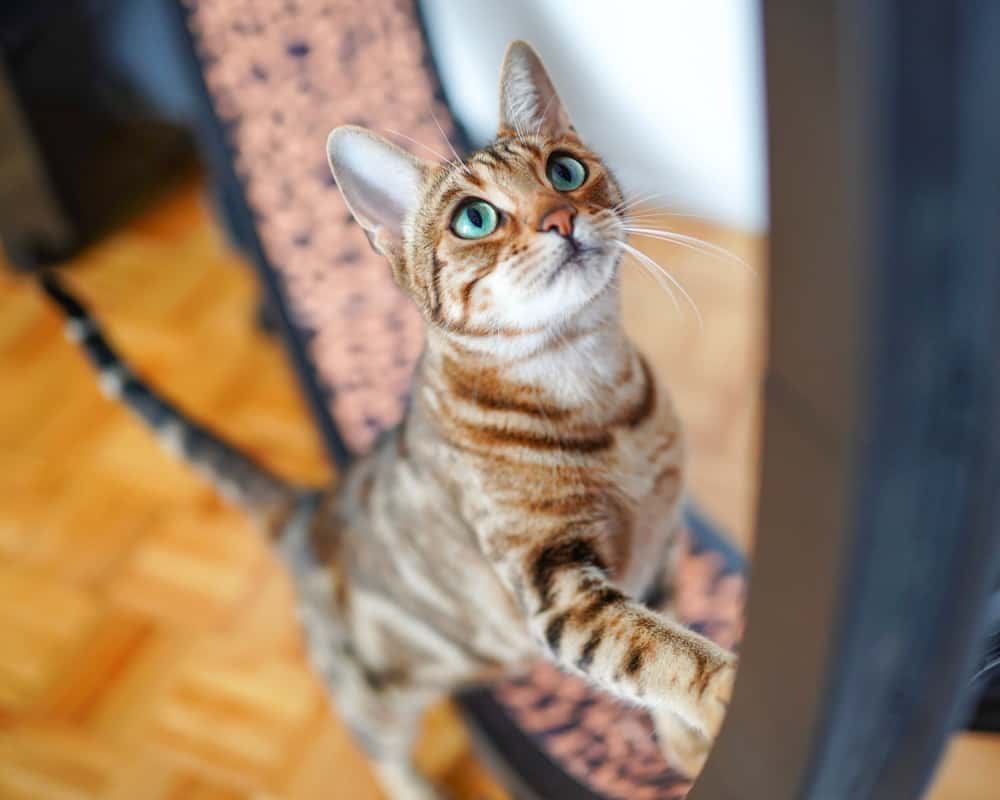
As you play with your Bengal, not once, but daily, or as much as you can depending on his energy level, you will find that their so-called “aggression” or “destruction” is just boredom. They’re brilliant cats that need stimulation, and without that stimulation, they will find it by themselves.
Recommended Products to Behaviorally Correct Bengal Cats
These are the products that I recommend whenever you’re dealing with a naughty Bengal cat:
1. Cat automatic deterrents
2. Matatabi sticks (to provide something they can bite)
3. Sticky paws (creating uncomfortable sticky surfaces to step on).
These are tools that are not only effective but also doesn’t negatively affect your relationship with your cats.
-
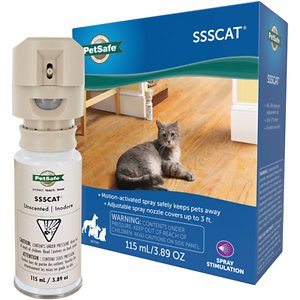 Check Price!
Check Price!The PetSafe SSSCAT Deterrent Cat Spray easily protects indoor areas and objects from your pets. This unique spray uses motion-activated infrared to monitor movement up to 3 feet away. When the SSSCAT detects your pet entering an off-limit area, it emits a harmless, odorless, and stainless spray to deter your pet from continuing.
We earn a commission if you click this link and make a purchase at no additional cost to you.
-
 Check Price!
Check Price!When push comes to shove, this can be a good tool to our teach cats what areas are unacceptable to be on. This is for people that don't want certain furniture to be scratched up and for stubborn cats that are set in their ways scratching up a certain type of furniture or material.
We earn a commission if you click this link and make a purchase at no additional cost to you.
-
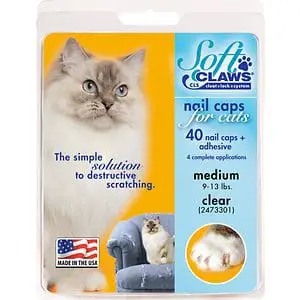 Check Price!
Check Price!Save your floors and furniture with Soft Claws Cat Nail Caps. A safe and pain-free alternative to declawing, Soft Claws works by simply capping your cat’s claws with a vinyl cover. It applies easily with a safe and non-toxic adhesive, and will not interfere with the normal extension and retraction of their nails—which means even the fussiest kitty won’t mind wearing them. So your cat can go about his routine of pawing and playing, and you don’t have to worry about unwanted scratches. Easy to apply and long-lasting, it’s made right here in the USA.
We earn a commission if you click this link and make a purchase at no additional cost to you.
-
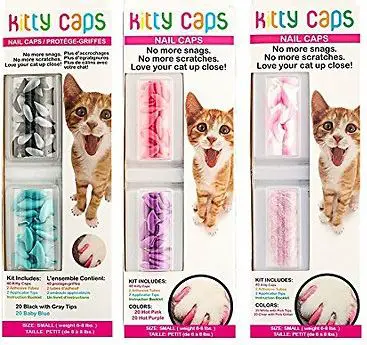 Check Price!
Check Price!Nail caps provide a safe alternative to declawing to stop all snags and scratches. Covers the nail completely while allowing normal extension and retraction of claws. Applied with included adhesive and will shed as your cat’s nails grow; generally in 4 - 8 weeks. Easy to apply and vinyl resin material is totally safe for cats. Choose from a variety of fun colors!
We earn a commission if you click this link and make a purchase at no additional cost to you.
-
 $12.99Check Price!
$12.99Check Price!These sticks have a similar effect to catnip for cats. Have these sticks around for your cats to bite and chew so that they don't chew other stuff around in your apartment or home (cables, electronic components, etc.). It also acts as a great teeth cleaner too!
We earn a commission if you click this link and make a purchase at no additional cost to you.
11/30/2025 07:02 am GMT -
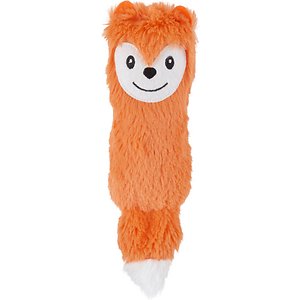 Check Price (US) Check Price (CA)
Check Price (US) Check Price (CA)This is another great tool for misdirection for when your cat is overstimulated and prone to biting. The furry tail adds motion to stimulate your kitty’s hunting instincts, so toss it to give him the thrill of the chase. It’s also spiked with Canadian catnip for even more exciting play
We earn a commission if you click this link and make a purchase at no additional cost to you.

I work and be tired I have toys for my Bengal he goes in the basement he wants me to go down so we can play peekaboo he is only 2 I am 53 I try to find toys but he is disinterested what can I do
I totally understand your issue! We love our little rocket buggers but yeah sometimes it’s nice to have some downtime. For me, I had to figure out what was the most energy-efficient way to play with my Bengal but at the same time, still have him engaged. Yes Bengals will get bored with a lot of things, they prefer their toys to be interactive. If you can find their “jackpot” toy, take note of the type of material, texture, and size. There’s something there that he enjoys.
I found that my Bengal loves his rubber ball, he loves this type of texture because he loves to bite chewy stuff. I can throw it a couple of times and he’ll be either bringing it back to me or be independently playing. When he loses interest with the ball, I will put the ball away for the next day. I think cycling toys is a good idea. Don’t have them all out at the same time. Always have some to be put away so it can feel fresh to your Bengal!
Another thing I would recommend is to maybe invest in a cat wheel. While a little expensive, it really helps them expend their energy when you’re not around. Bengals WILL independently go on the wheel. They really take to it faster than other cats.
Hi. I recognize this is rather off-topic, but I was wondering if you knew where I could get a captcha plugin for my remark form on my blog? I’m using the exact same blog site platform like yours, and also I’m having difficulty finding a good one? Many thanks a great deal.
Hi! I’m not exactly sure unfortunately – most of my website is default settings so I haven’t added any plugins. Sorry!
Hi, so I have a very vocal bengal… she loves to meow at every single little thing, any recommendations on how I can control her crying/talking? We recently moved into an apartment building and her cries are so loud, I just want to control it a little better.
Thanks!
Bengals are unfortunately very loud hahaha, they usually do it when they’re bored/want something. The best thing to do is to ignore. If you cave in and interact with them during their calls – then they’ll learn that’s how they get what they want. Earplugs and noise canceling headphones might help! Just for the time being as then, they’ll learn that calling isn’t the way to get what they want!
hi, we just have got our 5month old bengal kitten, hes a very good boy very affectionate,playful energetic. i just find that when its time to go toilet he meows and wants me to take him,at times he refuses to go and if i leave him in his cage and go cook or having dinner he pee’s next to his litter box and meowing constantly he only seems to go when i constantly tell him to “go toilet” I dont know if im doing the wrong thing by reminding him to go toilet he loves to be out i only put him in his cage if im out or bed, Im home most of the time and if i am out its only for about 2-3 hrs at most. i cant have a cat peeing all over the house thats why i constantly tell him after his meals to go toilet. i am going to try to not constantly annoy him with go toilet i will give him the chance to go on his own, but if it does happen again that he pees somewhere other then the litterbox what is the best way to disipline him.thanks
Sorry to hear about your problem. Litter box problems can be a really difficult thing to deal with for everyone. I have a general guideline for litter box elimination issues and most things have to do with either the location or the box itself. However, it’s going to be a lot of trial and error to pinpoint the issue.
Here’s a link to the flow that I use to help people when their cats exhibit litter box avoidance: https://monsieurtn.com/apartment-litter-box-solutions/#What_to_Do_When_Your_Cats_Eliminate_Outside_the_Litter_Box
Why do you keep him in a cage?? Maybe this is why he is not happy
My 5 month old female has the sa.e exact issue she also Eliminates on my bed if not allowed to to something like get in my plate…please help…
Hi! Thanks for your comment and same as above. This is going to take a bit of trial and error to find out the real culprit of the issue. It’s possible it has to do with a location issue or some sort of preference of either the litter box or litter type.
Following these steps might help:
https://monsieurtn.com/apartment-litter-box-solutions/#What_to_Do_When_Your_Cats_Eliminate_Outside_the_Litter_Box
I love yr blog. Super helpful as I’m in a similar situation (small apartment + love to acquire cats)
I have 3 at the moment as 1 passed away. I’m considering a bengal, but I’m worried he won’t get along with my other cats. I have scottish folds and 1 regular active cat. I swear 1 of my scottish folds are mixed bc he’s way too active for a scottish.
How u manage to get them to use their litter? One of my scottish folds refuse to poo in the box forna couple months now. He keepsnusing the bathtub. And when i filled it, he revenged on my bc looking at me while he pooped myside my shoes. (at least he was kind enough not to poop in my shoe.) 🤣😂
Thanks for your comment! That’s the first time I heard about a cat using the bathtub as a litter box! For litter box issues, the reasons are many! I have a step-by-step system that I follow if I ever find that a cat has litter problems here: https://monsieurtn.com/apartment-litter-box-solutions/#What_to_Do_When_Your_Cats_Eliminate_Outside_the_Litter_Box
So we have a bengal mix male. We rescued him, he had been returned 4 times prior to us, and was very chill in the pound. Well he is quite the opposite. Very lovable, vocal, and thinks is one of the dogs lol. However he does not get along with our other cat. We have a smaller female cat (both are fixed) and he will seek her out and absolutely beat her up. We have to keep them separated at all times, which is proving quite difficult at times. Any suggestions on how we can get them to co habitate?
I know this behavior well. It’s a combination associated with excess energy and general play aggression (male cats will exhibit this more than females). I think the first obvious thing is to curb his energy with interactive play or to redirect it towards something else. It’s best to have always some sort of kicker toy around that’s new and novel for him (just soak it in catnip), so whenever he tries to seek her out – take it out and use it to distract him.
The second way handle this is think about the environment and design some spots where only SHE can get to. Where it’s easy to defend herself if she’s on it. That way, she can have a good place to escape to whenever he starts getting too focused on her. Small single cat perches, a small ledge, or similar places are great ways to do this.
Hope this helps!
We have a Bengal and she can be really sweet but for some reason she likes to attack my girls. She will run and jump on them then bite them anywhere she can and for now reason. She will also wrap around their heads and try to claw and bite at the same time. It’s getting to the point where I don’t know what to do and if it continues she may have to go. If you have any suggestions I would greatly appreciate it!
Just wanted to thank you so much for your articles. My adorable Bengal is such a handful, but it is so much fun. She is so affectionate too. She just drives me mad but I wouldn’t have it any other way! 😂. I love the comparison to a Tasmanian Devil, also Rocket Bugger 😂 😂. I now look much older than my (many) years, for having my little love, but love every minute of our precious time. Thanks again. Happy